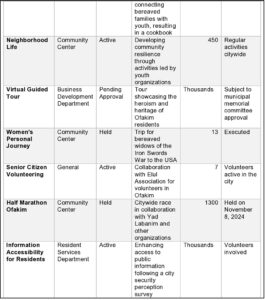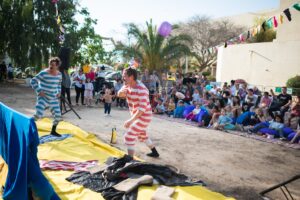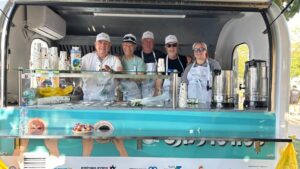1. Background
The devastating attack on October 7th severely impacted the social and economic resilience of the southern settlements, including the town of Ofakim. Following the attack, which left everyone in shock, Ofakim suffered losses due to the infiltration of terrorists. The severe trauma led the residents of the settlement to a vulnerable level of mental and social resilience, in addition to the severe economic damage left behind by the war.
To improve the well-being of the residents and strengthen the social and mental resilience of diverse populations in Ofakim, the “Mashiv HaRuach” (Restoring Spirit) project was born. The initiative came from both the JDC and Natan organizations. The meeting with the organization’s CEO and the mayor took place in November 2023, when it was decided to hold another meeting with senior management to familiarize themselves with the “Mashiv HaRuach” resilience model. The next step was another meeting with department heads in the municipality and formulating an implementation plan. The plan was finally approved in January 2024 and launched.
The “Mashiv HaRuach” program includes 21 different resilience programs that address various community areas and 12 partnerships with organizations and associations under the title “Renewal, Adaptation, Connection.”
2. Project Services
To implement the model optimally, a comprehensive mapping of the population in Ofakim was conducted. The mapping selected a representative sample from across the population spectrum. It was found that the war affected certain areas, such as the fact that about 56% of the city’s residents experienced economic damage due to the war, or 44% experienced loss in their close circle. Only 53% of respondents reported feeling a sense of security in the city. However, following the war, there was an increase in the community index; people rallied to help each other, cross-population connections were formed, and there was a sense of belonging and mutual responsibility.
The project’s goals are:
• To restore routine by creating a vibrant public space. After the trauma experienced by many Ofakim residents, they were afraid to go out into the street and return to routine. The project’s objective is to create activities in the public space that will enable building social resilience and a sense of community security.
• To create a narrative of heroism and pride following the war – the project will achieve this by developing the community resilience model by making information accessible to the public and through diverse consumer, leisure, and other programs.
The community mapping reached an important conclusion regarding the things that can be done to strengthen the sense of personal security and community resilience: to continue and increase activities that create a routine around leisure, to continue working together with residents for a common goal, and to provide accessible community responses for personal assistance in mental and social areas. The program model promoted and established diverse programs for vulnerable populations among the city’s residents. (National Service Year for Adults, Seniors’ Coffee Cart, City Hall at Your Doorstep, Parents’ Patrol, Strong Together, Heroism Race, etc.)
Another aspect found to be crucial for strengthening the sense of security is making information accessible to the residents. In this regard, the “Mashiv HaRuach” project revolutionized the city of Ofakim: a resident mailing system was established, residents were added to municipal update groups, a municipal app was created to provide access to information including a real-time service and information dashboard, and referents were recruited and trained for the various services.
3. Project Impact







